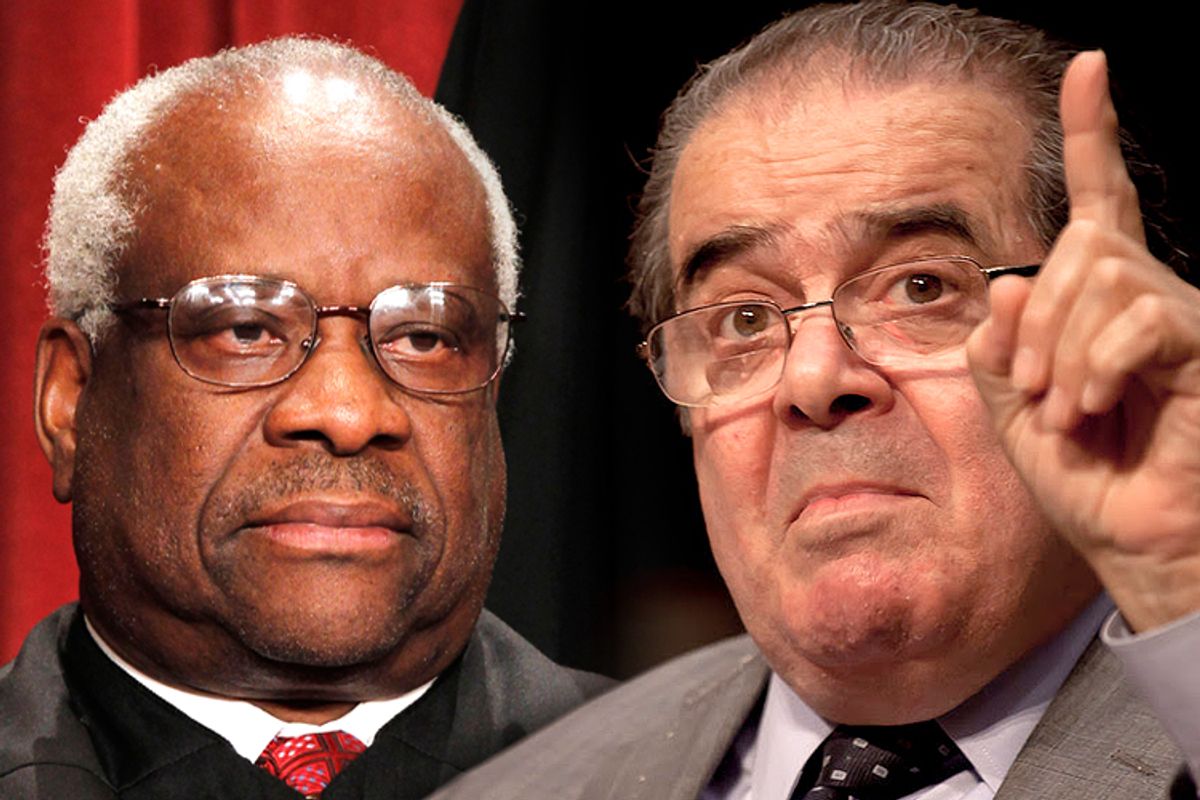In a 5-4 decision, the Supreme Court ruled Monday that Hobby Lobby can ignore federal law and deny its employees comprehensive health insurance because of its "sincerely held religious beliefs." Analysis of the case has so far called this a limited ruling because it only applies to closely held corporations and "only" impacts contraceptive coverage. But this framing completely ignores the fact that more than 90 percent of corporations in the United States are closely held, and that the court just effectively ruled that it's fine for employers to discriminate against half of the labor force. There's nothing limited about it. As Justice Ruth Bader Ginsburg noted in her powerful dissent, far from being narrow in its ruling, the high court just "ventured into a minefield."
So what does the decision actually mean? In the immediate term, it means that women who work at Hobby Lobby and Conestoga Wood Specialties are paying for health coverage (insurance is part of their compensation package, it's not some gift bestowed upon them by their bosses) that their employers have decided that they can't have. That's really what this comes down to in the most blunt terms imaginable. The religious owners of these companies have medically inaccurate ideas about contraception and abortion, and they now get to impose those ideas on the the people who work for them. In the majority opinion, five male justices argued that the Department of Health and Human Services can fill in the gaps in coverage created by this ruling by including for-profit companies in the accommodation system created for religious nonprofits and other explicitly faith-based organizations. Women's health, it seems, has become someone else's problem.
This is certainly bad news for the women who work at both of these places, but it's bad news for the rest of us, too. The ruling sends a strong message that women's health and women's rights -- as individuals and employees -- do not matter as much as so-called religious liberty. It also shows once again that medically inaccurate ideas about healthcare can dictate the terms of a debate and ultimately win the day. Writing for the majority, Justice Samuel Alito argued that contesting Hobby Lobby's claim that contraception is the same thing as abortion -- an idea that has been refuted time and again by medical providers and associations -- "in effect tells the plaintiffs that their beliefs are flawed."
And as Ginsburg alluded to in her dissent, the decision opens the door to other sweeping forms of discrimination. While Hobby Lobby based its claim in its apparent objection to four forms of emergency contraception (contraception that the company covered without issue prior to the new healthcare law), other companies challenging the requirement object to all forms of contraception. Those beliefs are just as sincerely held, and just as dangerous to women's health. The legal precedent now tips in their favor.
The opinion also raises the question of whose religious beliefs matter. Conservatives are hailing this as a victory for freedom of religion, but what about the religious employees at Hobby Lobby who don't share the views of the Green family? The Greens' profoundly unscientific and extreme views about contraception are not even universally accepted among Christians. Where's their religious liberty in this? And for the women whose religious liberty is freedom from religion? Where are they in this opinion? "The Court puts claims of corporations over those of its employees and allows a corporation's owners to override the Federal rights of its employees, many of whom have a different set of religious beliefs," Ginsburg wrote in her dissent.
And this is one of the ways that the framing of this case has been off from the start. The lawyers for Hobby Lobby presented the legal challenge as though it were the religious lobby versus the reproductive rights lobby, and many in the media accepted these terms. But religious people use contraception -- including emergency contraception. People of faith also have a major stake in keeping employers from imposing religious views on employees. The fault lines in the case have never been as clean as some would like you to believe.
To sum it up, five male justices ruled that thousands of female employees should rightfully be subjected to the whims of their employers. That women can be denied a benefit that they already pay for and is guaranteed by federal law. That contraception is not essential healthcare. That corporations can pray. That the corporate veil can be manipulated to suit the needs of the corporation. That bosses can cynically choose à la carte what laws they want to comply with and which laws they do not. Each specific finding opens a door to a new form of discrimination and unprecedented corporate power. If you think this ruling won't affect you, you haven't been paying attention. If you think these corporations are going to stop at birth control, you're kidding yourself.

Shares